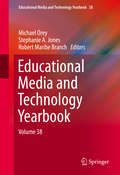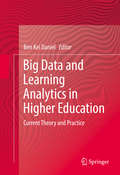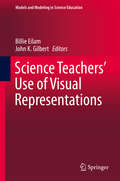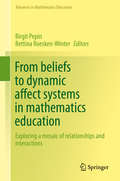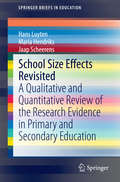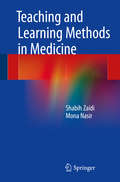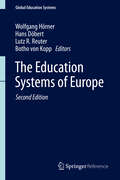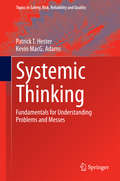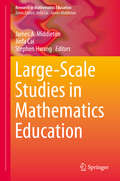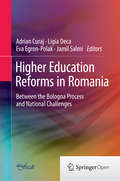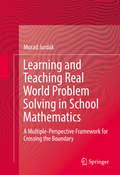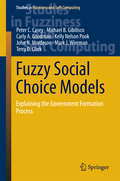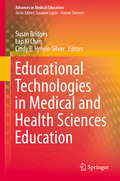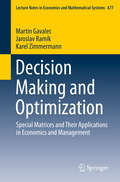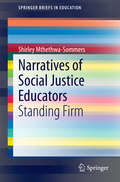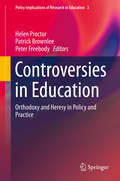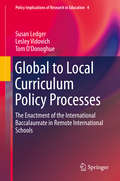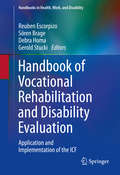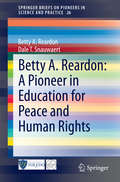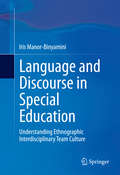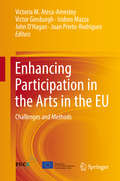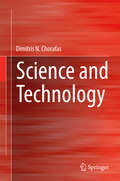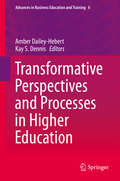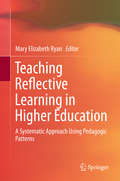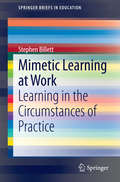- Table View
- List View
Educational Media and Technology Yearbook, Volume 38
by Robert Maribe Branch Michael Orey Stephanie A. JonesThe latest edition of the Educational Media and Technology Yearbook, from the Association for Education, Communication and Technology (AECT), notes the most current trends in the field of learning design and technology, taking into account the implications for both formal and informal learning. Pivotal research and discussion surrounding educational trends, leadership, organizations and programs have all been updated from volume 37. Chapters train their focus on graduate and professional goals, including an analysis of doctoral programs in educational technology and new collaborative learning platforms. Library science is a featured component of this analysis and Library Science programs are featured prominently in this analysis. This edition also features new content on mediagraphy.
Big Data and Learning Analytics in Higher Education: Current Theory and Practice
by Ben Kei DanielThis book focuses on the uses of big data in the context of higher education. The book describes a wide range of administrative and operational data gathering processes aimed at assessing institutional performance and progress in order to predict future performance, and identifies potential issues related to academic programming, research, teaching and learning. Big data refers to data which is fundamentally too big and complex and moves too fast for the processing capacity of conventional database systems. The value of big data is the ability to identify useful data and turn it into useable information by identifying patterns and deviations from patterns.
Science Teachers' Use of Visual Representations
by Billie Eilam John K. GilbertThis book examines the diverse use of visual representations by teachers in the science classroom. It contains unique pedagogies related to the use of visualization, presents original curriculum materials as well as explores future possibilities. The book begins by looking at the significance of visual representations in the teaching of science. It then goes on to detail two recent innovations in the field: simulations and slowmation, a process of explicit visualization. It also evaluates the way teachers have used different diagrams to illustrate concepts in biology and chemistry. Next, the book explores the use of visual representations in culturally diverse classrooms, including the implication of culture for teachers' use of representations, the crucial importance of language in the design and use of visualizations and visualizations in popular books about chemistry. It also shows the place of visualizations in the growing use of informal, self-directed science education. Overall, the book concludes that if the potential of visualizations in science education is to be realized in the future, the subject must be included in both pre-service and in-service teacher education. It explores ways to develop science teachers' representational competence and details the impact that this will have on their teaching. The worldwide trend towards providing science education for all, coupled with the increased availability of color printing, access to personal computers and projection facilities, has lead to a more extensive and diverse use of visual representations in the classroom. This book offers unique insights into the relationship between visual representations and science education, making it an ideal resource for educators as well as researchers in science education, visualization and pedagogy.
From beliefs to dynamic affect systems in mathematics education
by Birgit Pepin Bettina Roesken-WinterThis book connects seminal work in affect research and moves forward to provide a developing perspective on affect as the "decisive variable" of the mathematics classroom. In particular, the book contributes and investigates new conceptual frameworks and new methodological 'tools' in affect research and introduces the new field of 'collectives' to explore affect systems in diverse settings. Investigated by internationally renowned scholars, the book is build up in three dimensions. The first part of the book provides an overview of selected theoretical frames - theoretical lenses - to study the mosaic of relationships and interactions in the field of affect. In the second part the theory is enriched by empirical research studies and provides relevant findings in terms of developing deeper understandings of individuals' and collectives' affective systems in mathematics education. Here pupil and teacher beliefs and affect systems are examined more closely. The final part investigates the methodological tools used and needed in affect research. How can the different methodological designs contribute data which help us to develop better understandings of teachers' and pupils' affect systems for teaching and learning mathematics and in which ways are knowledge and affect related?
School Size Effects Revisited
by Jaap Scheerens Hans Luyten Maria HendriksThis book provides a thorough review of the research literature on the effect of school size in primary and secondary education on three types of outcomes: student achievement, non-cognitive outcomes and costs per student. Based on 84 scientific publications and several prior reviews, the book discusses four main areas: the impact of school size on cognitive learning outcomes and non-cognitive outcomes; the "state of the art" of empirical research on economies of size; the direct and indirect impact of school size, conditioned by other school context variables on student performance and the specific position of the Netherlands in an international perspective. The book presents summaries of the results and main conclusions found and discusses these with respect to their relevance for educational policy in general and for the Netherlands in particular. The book concludes with suggestions for future research on school size.
Teaching and Learning Methods in Medicine
by Shabih Zaidi Mona NasirThis book considers the evolution of medical education over the centuries, presents various theories and principles of learning (pedagogical and andragogical) and discusses different forms of medical curriculum and the strategies employed to develop them, citing examples from medical schools in developed and developing nations. Instructional methodologies and tools for assessment and evaluation are discussed at length and additional elements of modern medical teaching, such as writing skills, communication skills, evidence-based medicine, medical ethics, skill labs and webinars, are fully considered. In discussing these topics, the authors draw upon the personal experience that they have gained in learning, teaching and disseminating knowledge in many parts of the world over the past four decades. Medical Education in Modern Times will be of interest for medical students, doctors, teachers, nurses, paramedics and health and education planners.
The Education Systems of Europe
by Wolfgang Hörner Hans Döbert Lutz R. Reuter Botho KoppThis updated second edition presents an analytical description of the education systems of all European countries, following common guidelines. These conceptual guidelines consider various criteria concerning presumptions as to the quality of a good education system. One of the book central aims is to explore the paradoxical character of education, i. e. the relationship between universal values and the search for a national identity. The common structure of the different country analyses oriented by crucial problems of education worldwide guides to discover common patterns of European education compared to that of education systems outside Europe, making its reading relevant to educators around the world. The handbook provides many suggestions for further study.
Systemic Thinking
by Kevin Macg. Adams Patrick T. HesterWhether you're an academic or a practitioner, a sociologist, a manager, or an engineer, one can benefit from learning to think systemically Problems (and messes) are everywhere and they're getting more complicated every day How we think about these problems determines whether or not we'll be successful in understanding and addressing them This book presents a novel way to think about problems (and messes) necessary to attack these always-present concerns The approach draws from disciplines as diverse as mathematics, biology and psychology to provide a holistic method for dealing with problems that can be applied to any discipline. This book develops the systemic thinking paradigm, and introduces practical guidelines for the deployment of a systemic thinking approach.
Large-Scale Studies in Mathematics Education
by Stephen Hwang James A. Middleton Jinfa CaiIn recent years, funding agencies like the Institute of Educational Sciences and the National Science Foundation have increasingly emphasized large-scale studies with experimental and quasi-experimental designs looking for 'objective truths' Educational researchers have recently begun to use large-scale studies to understand what really works, from developing interventions, to validation studies of the intervention, and then to efficacy studies and the final "scale-up" for large implementation of an intervention. Moreover, modeling student learning developmentally, taking into account cohort factors, issues of socioeconomics, local political context and the presence or absence of interventions requires the use of large data sets, wherein these variables can be sampled adequately and inferences made Inroads in quantitative methods have been made in the psychometric and sociometric literatures, but these methods are not yet common knowledge in the mathematics education community. In fact, currently there is no volume devoted to discussion of issues related to large-scale studies and to report findings from them This volume is unique as it directly discusses methodological issue in large-scale studies and reports empirical data from large-scale studies.
Higher Education Reforms in Romania
by Adrian Curaj Ligia Deca Eva Egron-Polak Jamil SalmiRomania is an active player in various international higher education areas, while undergoing a series of higher education reforms within its national framework. The Higher Education Evidence Based Policy Making: a necessary premise for progress in Romania project was implemented by the Executive Agency for Higher Education, Research, Development and Innovation Funding (UEFISCDI) in the timeframe February 2012 - February 2014, being co-financed by the European Social Fund through the Operational Programme "Administrative Capacity Development". The project aimed to increase the capacity of public administration for evidence-based policy making in the field of higher education, while focusing on good practices at international level and impact assessment. With the contribution of the national and international experts, the project has generated a number of analysis and studies on the existing higher education public policies (quality assurance, internationalisation, equity, data collection, the Bologna Process, financing of higher education). Based on the results of the project, the book will reunite a number of policy research articles which would tap into the innovative aspects of the project's activities and provide a concise overview of what good practices can be drawn from the empirical research conducted in this project. The book will therefore aim to improve the information on Romanian higher education reforms, as well as on the concrete evidence-based policy proposals which could be transformed into future policy solutions in the Romanian higher education system.
Learning and Teaching Real World Problem Solving in School Mathematics
by Murad JurdakThe ultimate aim of this book is to identify the conceptual tools and the instructional modalities which enable students and teachers to cross the boundary between school mathematics and real world problem solving. The book identifies, examines, and integrates seven conceptual tools, of which five are constructs (activity theory, narrative, modeling, critical mathematics education, ethnomathematics) and two are contexts (STEM and the workplace). The author develops two closely linked multiple-perspective frameworks: one for learning real world problem solving in school mathematics, which sets the foundations of learning real world problem solving in school mathematics; and one for teaching real world problem solving in school mathematics, which explores the modalities of teaching real world problem solving in school mathematics. "The book is composed as, on the one hand, a high-level theoretical scholarly work on real world problem solving in school mathematics, and, on the other hand, a set of twelve narratives which, put together, constitute a thought-provoking and moving personal and professional autobiography. " - Mogens Niss "These narratives combine aspects of Murad's personal trajectory as an individual with those points in his professional career at which he became aware of perspectives on and approaches to mathematics education that were both significant in and of themselves, and instrumental for the specific scholarly endeavor presented in the book. " - Mogens Niss
Fuzzy Social Choice Models
by Peter C. Casey Michael B. Gibilisco Carly A. Goodman Kelly Nelson Pook John N. Mordeson Mark J. Wierman Terry D. ClarkThis book explores the extent to which fuzzy set logic can overcome some of the shortcomings of public choice theory, particularly its inability to provide adequate predictive power in empirical studies. Especially in the case of social preferences, public choice theory has failed to produce the set of alternatives from which collective choices are made. The book presents empirical findings achieved by the authors in their efforts to predict the outcome of government formation processes in European parliamentary and semi-presidential systems Using data from the Comparative Manifesto Project (CMP), the authors propose a new approach that reinterprets error in the coding of CMP data as ambiguity in the actual political positions of parties on the policy dimensions being coded. The range of this error establishes parties' fuzzy preferences. The set of possible outcomes in the process of government formation is then calculated on the basis of both the fuzzy Pareto set and the fuzzy maximal set, and the predictions are compared with those made by two conventional approaches as well as with the government that was actually formed. The comparison shows that, in most cases, the fuzzy approaches outperform their conventional counterparts.
Educational Technologies in Medical and Health Sciences Education
by Susan Bridges Lap Ki Chan Cindy E. Hmelo-SilverThis evidence-packed guide explores the growing importance of new technologies and situated learning in the vanguard of medical and health sciences education, backed by real-world clinical applications. Its dual emphasis on problem-based learning (PBL) and applied learning is reflected in the range of author perspectives, from understanding how technologies engage learners to implications for program design. Innovations covered range from wider and more targeted use of mobile devices and electronic medical records to video cases and virtual patients, in clinical contexts from family practice to specialized surgery. At the same time, chapters detail both the necessary hardware for putting these systems into place and the software needed to make them accessible to learners. Among the featured topics: Technology and group processes in PBL: An ethnographic study. What is real? Using problem-based learning in virtual worlds. Are Wikipedia articles reliable learning resources in PBL curricula? Utilizing mobile electronic health records in clinical education. Measuring emotions in medicine: methodological and technological advances within authentic medical learning environments. The deteriorating patient smartphone app: towards serious game design. Medical/health sciences educators and researchers in educational technology will look to Educational Technologies in Medical and Health Sciences Education to pinpoint current and future trends in an ever-important field.
Decision Making and Optimization
by Martin Gavalec Jaroslav Ramík Karel ZimmermannThe book is a benefit for graduate and postgraduate students in the areas of operations research, decision theory, optimization theory, linear algebra, interval analysis and fuzzy sets. The book will also be useful for the researchers in the respective areas. The first part of the book deals with decision making problems and procedures that have been established to combine opinions about alternatives related to different points of view. Procedures based on pairwise comparisons are thoroughly investigated. In the second part we investigate optimization problems where objective functions and constraints are characterized by extremal operators such as maximum, minimum or various triangular norms (t-norms). Matrices in max-min algebra are useful in applications such as automata theory, design of switching circuits, logic of binary relations, medical diagnosis, Markov chains, social choice, models of organizations, information systems, political systems and clustering. The input data in real problems are usually not exact and can be characterized by interval values.
Narratives of Social Justice Educators
by Shirley Mthethwa-SommersThis book presents narratives of eminent social justice educators, which provide a window into why these educators have made it their mission to educate for attainment of social justice; it succinctly defines what social justice education is and what it is not. Eleven nationally and internationally eminent narratives of social justice educators, namely, Beverly Daniel Tatum, Sonia Nieto, Kevin Kumashiro, Valerie Ooka Pang, Teresita Aguilar, Gaille Canella, Christine Sleeter, Julie Andrzejewski, Norma Bailey, Kent Koppelman, and Cathy Pohan, are featured. Racial, gender, socio-economic class, and sexuality diversity of the social justice educators enriches the book by providing multidimensional perspectives on the impact of social positioning in choosing to educate for social justice. Chapter One, "Introduction to Social Justice Educators," provides an in-depth introduction to the social justice educators who are featured in the book. It delineates reasons they were selected to participate in the study of narratives for social justice educators. This chapter highlights diverse paths that contributed to the participants engaging in social justice education and outlines all their contributions to social justice education. Chapter Two, "Personal Influence," describes the participants' personal influences and how formative years of interacting with family members and peers contributed in shaping their identities as social justice educators. In addition, this chapter examines how their varied racial, gender, and sexuality identities served to prepare them for their profession. Chapter Three, "Professional Influence," offers a window into the participants' professional life influences on their choice to work toward social justice education. The educators discuss the impact of individual teachers and professors, the field in which they work and exposure to specific curriculum and readings that served to ignite their interest in educating for social justice. Chapter Four, " Impact of Social and Historical Events," explores the influence of social and historical events had in the evolution of social justice educators. Such events compelled social justice educators to critically reflect on their roles in society and the importance of engaging in social justice activism through their work. Chapter Five, " Reasons for Standing Firm," focuses on reasons that keep social justice educators holding firm to their convictions of social justice education and teaching for social change. It explores the role of spirituality and their sense of commitment. Chapter Six , "Epilogue," offers a synthesis of the experiences of social justice educators, implications for teacher education programs, and lessons that can be gleaned from their narratives. Stories from the social justice educators provide theoretical and pedagogical frameworks for teaching about social justice issues in education. Each chapter concludes with lessons that can be gleaned from the narratives and applied when working with students.
Controversies in Education: Orthodoxy and Heresy in Policy and Practice (Policy Implications of Research in Education #3)
by Peter Freebody Helen Proctor Patrick BrownleeThis book is the outcome of a colloquium series organized by The University of Sydney in which leading and emerging researchers were invited to name what they took to be the deep flaws at the heart of contemporary educational and policy and practice in Australia and globally -- to voice their potentially 'heretical' views on what most urgently needs to be done. The chapters in this collection are paired to offer two takes on each topic, from supplementing to critiquing to countering and most points in between. The issues addressed in this volume include: the place of education in national and international marketplaces, mass testing and standardisation, the future of 'multiculturalism' in schools, the public funding of private schools, the complicated relationship between evidence and policy and the shifting politics of inequality. This book is based on the idea that recognising deep disagreements on big issues is a necessary accompaniment to imagining and developing productive ways forward.
Global to Local Curriculum Policy Processes
by Lesley Vidovich Susan Ledger Tom O'DonoghueThis book explores the dynamics of curriculum policy processes involved in the adoption, production and enactment of the International Baccalaureate Primary Years Programme (IBPYP), accredited by the International Baccalaureate Organization (IBO). It addresses deficits in current literature and provides insight into and the complexities involved within a framework that takes cognisance of the relationships between global, regional, national and local levels of education policy processes. In doing so, it contributes to the current body of research on international education, remote education and policy processes. The IBPYP is one of the three programmes that go to make up the increasingly popular suite of programmes offered by the IBO. Given the exponential growth of international schools caused by an ever changing globalized world and a mobile workforce, international curriculum policy is becoming more complex. This has lead to a recognition of the need for a range of policy analysis studies in the field. The study presented in this book was conceptualised in the light of such recognition. This relatively uncharted field has been explored by focusing on one of the most 'unusual' settings. Accordingly, the adoption, production and enactment of the IBPYO at three remote international schools has been examined. The study also addresses how the phenomena of 'international schools' and 'remote schools' complement or compete with, each other. This results in a better understanding of the educational policies informing both 'international schools' and 'remote schools' and the interconnectivity that might exist between them.
Handbook of Vocational Rehabilitation and Disability Evaluation
by Reuben Escorpizo Sören Brage Debra Homa Gerold StuckiThis book presents the state of the art in the application and implementation of the WHO's International Classification of Functioning, Disability and Health (ICF) in the areas of vocational rehabilitation as a primary topic and disability evaluation as a secondary topic. Application of the ICF and implementation strategies toward a holistic and comprehensive approach to work disability and vocational rehabilitation programs are presented along with clinical cases and exercises. The ICF as a topic in health and disability has been gaining momentum since its approval by the World Health Assembly in 2001, and great progress has been made since then. However, the integration if the ICF in the realm of vocational rehabilitation has been lacking despite the fact that work and employment are a major area in people's lives, particularly those who have work disability. This book will advance the professional practice of vocational rehabilitation, rehabilitation counseling, occupational medicine, and allied health science.
Betty A. Reardon: A Pioneer In Education For Peace And Human Rights (SpringerBriefs on Pioneers in Science and Practice #26)
by Betty A. Reardon Dale T. SnauwaertBetty A. Reardon is a world-renowned leader in the fields of peace education and human rights; her pioneering work has laid the foundation for a new cross-disciplinary integration of peace education and international human rights from a gender-conscious, global perspective. This collection of reflective inquiry and ongoing research gathers essential works on peace education and human rights (1967-2014) and provides access to Reardon's key works. These texts have been foundational to the field of peace education during the past five decades of her practical experience. The unique conceptualization of a holistic framework for organizing content and the practical and specific descriptions of pedagogies for the practice of critical peace education in schools and universities, have made them essential resources for peace educators around the world; several have already become standard texts for basic courses in the field. The book also includes an overview of Reardon's career and a bibliography of her publications.
Language and Discourse in Special Education
by Iris Manor-BinyaminiThis book examines the words and discourse as well as their meaning and impact on the everyday culture of a multidisciplinary team at a school for students with mental disabilities. The book examines the organizational, social, professional, and emotional experiences of team members from such disciplines as child and school psychology, special education, therapy (e. g. , occupational, speech), social work, and pediatric medicine within a special education school. It explores the ways in which team members describe and interpret the day-to-day requirements of working effectively in a special education school, using their own language and discourse from a subjective point of view. In addition, the book analyzes and interprets the influence of language and discourse on the outlook, behavior patterns, and the coping of team members working in the school with the students, among themselves as a team, and with the difficulties and dilemmas that concern them as well the solutions that they themselves introduce for all these issues. This book, with its focus on the unique and complex work environment of the multidisciplinary special education team, is essential reading for researchers, professionals, and graduate students in child and school psychology, therapeutic disciplines (e. g. , occupational, speech), social work, pediatric medicine, and allied mental health and medical fields.
Enhancing Participation in the Arts in the EU
by Victor Ginsburgh Victoria M. Ateca-Amestoy Isidoro Mazza John O'Hagan Juan Prieto-RodriguezIn this book, cultural participation is analyzed as a substantial aspect of European citizenship, but also as a tool for improving individual and societal wellbeing through educational and inclusive policies. It offers an up-to-date overview of ongoing research on the measurement, analysis and prospects of traditional and new forms of cultural engagement in Europe. It describes and assesses available methods and cultural participation and seeks to determine how and how much the various drivers, policies and barriers matter. This publication is the final output of the work done by the members of the EU project "Assessing effective tools to enhance cultural participation," which brought together social scientists and cultural practitioners in joint projects, conferences and seminars, to reflect on the current situation and the challenges faced by managers of cultural institutions and cultural policy makers. The project was awarded a European Union Grant by the CULTURE 2007-2013 program.
Science and Technology
by Dimitris N. ChorafasThe aim of this book is to explore science and technology from the viewpoint of creating new knowledge, as opposed to the reinterpretation of existing knowledge in ever greater but uncertain detail. Scientists and technologists make progress by distinguishing between what they regard as meaningful and what they consider as secondary or unimportant. The meaningful is dynamic; typically, the less important is static. Science and technology have made a major contribution to the culture and to the standard of living of our society. From antiquity to the present day, the most distinguished scientists and technologists have been thinkers, experimenters and persons willing and able to challenge "the obvious". Technology develops products and processes based on the breakthroughs of science. If technologists fail to steadily upgrade their skills, tools and methods, they will only be as good as their last design, risking obsolescence. Using practical examples and case studies, this book documents the correlations existing between science and technology, and elucidates these correlations with practical applications ranging from real-life situations, from R&D to energy production. As it is a salient problem, and a most challenging one to our society, power production has been chosen as a major case study. The holistic approach to science and technology followed by this text enhances the ability to deliver practical results. This book is intended for students and researchers of science, technology and mathematical analysis, while also providing a valuable reference book for professionals. Its subject is one of the most debated problems of mankind.
Transformative Perspectives and Processes in Higher Education
by Amber Dailey-Hebert Kay S. DennisThis book aims to provide insight into the complexities confronting higher education today and to highlight tangible opportunities that exist to address such issues. We are in a constant state of flux and higher education needs to respond in more proactive, intentional and innovative ways to remain a relevant cornerstone to society and culture. The editors begin by asking how our collective reality might change if the complexity and uncertainty surrounding us were embraced and leveraged to serve the learner and society as a whole. They invite the reader to explore collaborative approaches to individualized learning pathways, networked learning and a reimagined ecosystem of academia. The chapters are arranged to inform the reader seeking knowledge on how to 1) reshape and redefine the 21st century university, with its evolving role in these transformative times; 2) design and implement courses that address the changing needs of the university and the non-traditional student; and 3) utilize research on innovative strategies with processes that promote organizational learning. The chapters profile the fluid nature of learning as it evolves in higher education and the workplace, often with a blurred line separating the two environments. Exciting ideas related to heutagogy, problem-based learning, innovative constructivist strategies, authentic learning and self-regulated learning all converge in this volume.
Teaching Reflective Learning in Higher Education
by Mary Elizabeth RyanThis book is about understanding the nature and application of reflection in higher education. It provides a theoretical model to guide the implementation of reflective learning and reflective practice across multiple disciplines and international contexts in higher education. The book presents research into the ways in which reflection is both considered and implemented in different ways across different professional disciplines, while maintaining a common purpose to transform and improve learning and/or practice. The Readers will find this book is innovative and new in three key ways. Firstly, in its holistic theorisation of reflection within the pedagogic field of higher education; Secondly, in conceptualising reflection in different modes to achieve specific purposes in different disciplines; and finally, in providing conceptual guidance for embedding reflective learning and reflective practice in a systematic way across whole programmes, faculties or institutions in higher education. The book considers important contextual factors that influence the teaching of forms and methods of reflection. It provides a functional analysis of multiple modes of reflection, including written, oral, visual, auditory, and embodied forms. Empirical chapters analyse the application of these modes across disciplines and at different stages of a programme. The theoretical model accounts for students' stage of development in the disciplinary field, along with progressive and cyclical levels of higher order thinking, and learning and professional practice that are expected within different disciplines and professional fields. Secondly, in conceptualising reflection in different modes to achieve specific purposes in different disciplines. It provides a functional analysis of multiple modes of reflection, including written, oral, visual, auditory, and embodied forms. Empirical chapters analyse the application of these modes across disciplines and at different stages of a programme in terms of demonstrating levels of reflection. The book includes images, diagrams and different text forms to support the creative applications of reflection. And thirdly, the book is innovative in providing conceptual guidance for embedding reflective learning and reflective practice systematically across whole programmes, faculties or institutions in higher education contexts across the world.
Mimetic Learning at Work
by Stephen BillettThe concept of mimetic learning at work is outlined and elaborated in this text. That elaboration consists of an account of how securing occupational capacities has been primary associated with learning processes and an explanation of those processes. Much, and probably most, of the learning and development across individuals working lives occurs outside of circumstances of direct guidance or instruction. Yet, recent considerations of individuals' epistemologies and developments form anthropology and cognitive science suggest that current explanations about individuals' contributions to learning at and through work are incomplete. So, there is need for an emphasis on individuals' processes of learning, both within and outside of situations of guidance by more experienced workers, needs to be more fully understood, and accepted as being person dependent. Contributions from anthropology, developmental studies, and cognitive neuroscience now augment those from sociocultural theory.
